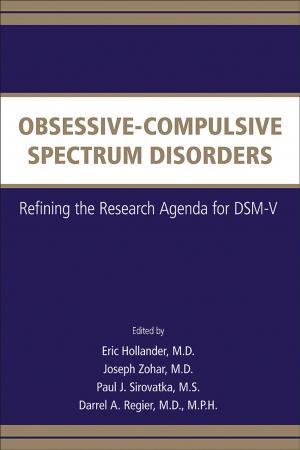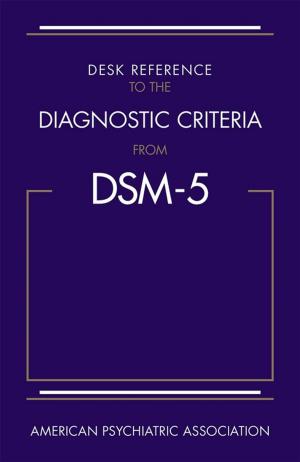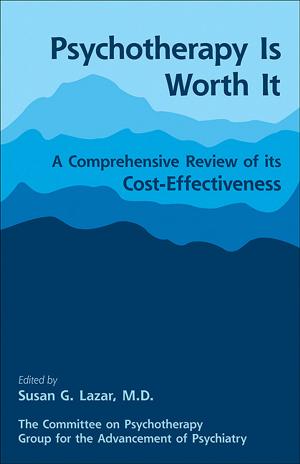| Author: | ISBN: | 9781585627851 | |
| Publisher: | American Psychiatric Publishing | Publication: | August 13, 2008 |
| Imprint: | American Psychiatric Association Publishing | Language: | English |
| Author: | |
| ISBN: | 9781585627851 |
| Publisher: | American Psychiatric Publishing |
| Publication: | August 13, 2008 |
| Imprint: | American Psychiatric Association Publishing |
| Language: | English |
In sharp contrast to the prevailing belief during the past century that schizophrenia inevitably results in a progressive deteriorating clinical course, research since the early 1980s shows that early intervention can significantly improve the long-term outcome of this complex illness. With very early treatment, many affected individuals can achieve an excellent recovery.
This research has set off an explosion of interest in -- and optimism about -- early intervention in what was once thought to be an intractable illness. The work of 19 top experts in the field of schizophrenia research is available in this single, powerful volume that introduces the concept of early intervention and describes the clinical approaches most likely to facilitate the fullest degree of recovery. Contributors review the clinical and epidemiological evidence that supports the importance of comprehensive and optimal treatment during the early stages of schizophrenia -- treatment that must encompass emotional, family, and vocational as well as pharmacological needs of affected individuals.
This rich overview is organized into three major parts: Early Intervention, Epidemiology, and Natural History of Schizophrenia, which presents an overview of important concepts in early intervention and reviews our current understanding of the outcome from a first episode of schizophrenia, including which features predict the onset of first-episode psychosis Management of the Early Stages of Schizophrenia, which reviews the critical management issues in providing specialized and optimal care to this complex patient group and their families, including meeting the patient's emotional needs Neurobiological Investigations of the Early Stages of Schizophrenia, which describes important specialized topics that contribute to our understanding of the first episode of schizophrenia, including schizophrenia in childhood and adolescence and cognitive dysfunction in the early stages of schizophrenia
This ground-breaking volume provides reason for new optimism about the treatment and outcome of schizophrenia. With its dramatically different perspective on the potential long-term outcome of a still-baffling illness, this volume is a must-read for mental health practitioners and educators, psychiatry residents, and family members of affected individuals.
In sharp contrast to the prevailing belief during the past century that schizophrenia inevitably results in a progressive deteriorating clinical course, research since the early 1980s shows that early intervention can significantly improve the long-term outcome of this complex illness. With very early treatment, many affected individuals can achieve an excellent recovery.
This research has set off an explosion of interest in -- and optimism about -- early intervention in what was once thought to be an intractable illness. The work of 19 top experts in the field of schizophrenia research is available in this single, powerful volume that introduces the concept of early intervention and describes the clinical approaches most likely to facilitate the fullest degree of recovery. Contributors review the clinical and epidemiological evidence that supports the importance of comprehensive and optimal treatment during the early stages of schizophrenia -- treatment that must encompass emotional, family, and vocational as well as pharmacological needs of affected individuals.
This rich overview is organized into three major parts: Early Intervention, Epidemiology, and Natural History of Schizophrenia, which presents an overview of important concepts in early intervention and reviews our current understanding of the outcome from a first episode of schizophrenia, including which features predict the onset of first-episode psychosis Management of the Early Stages of Schizophrenia, which reviews the critical management issues in providing specialized and optimal care to this complex patient group and their families, including meeting the patient's emotional needs Neurobiological Investigations of the Early Stages of Schizophrenia, which describes important specialized topics that contribute to our understanding of the first episode of schizophrenia, including schizophrenia in childhood and adolescence and cognitive dysfunction in the early stages of schizophrenia
This ground-breaking volume provides reason for new optimism about the treatment and outcome of schizophrenia. With its dramatically different perspective on the potential long-term outcome of a still-baffling illness, this volume is a must-read for mental health practitioners and educators, psychiatry residents, and family members of affected individuals.















